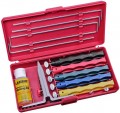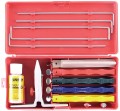Max. grain
The largest grain size of the abrasive surface provided in the design of the sharpener (or among the replaceable whetstones supplied as standard).
See “Min. graininess" above. This parameter is indicated only if the sharpener has several abrasive surfaces with different grain sizes. The greater the difference between the minimum and maximum graininess, the more universal this model is, usually, the more options it offers in terms of processing intensity. On the other hand, a wide variety of abrasive surfaces has a corresponding effect on the cost.
Serrated sharpening
Possibility of using a sharpener for
sharpening serrated blades.
Such blades have a serrated cutting edge, for which the classical method of sharpening, on a flat surface, is unsuitable: such a procedure will simply erase the teeth and, at best, turn the serrated blade into a classic smooth one. Therefore, for sharpening in this case, special devices are used: thin rods made of abrasive material, somewhat tapering towards the end. With such a rod, each individual tooth is sharpened separately; this work can be quite laborious, but it allows you to restore the full performance of the serrated blade. At the same time, note that for blades with fine teeth, even such a specialized sharpener may be too large.

